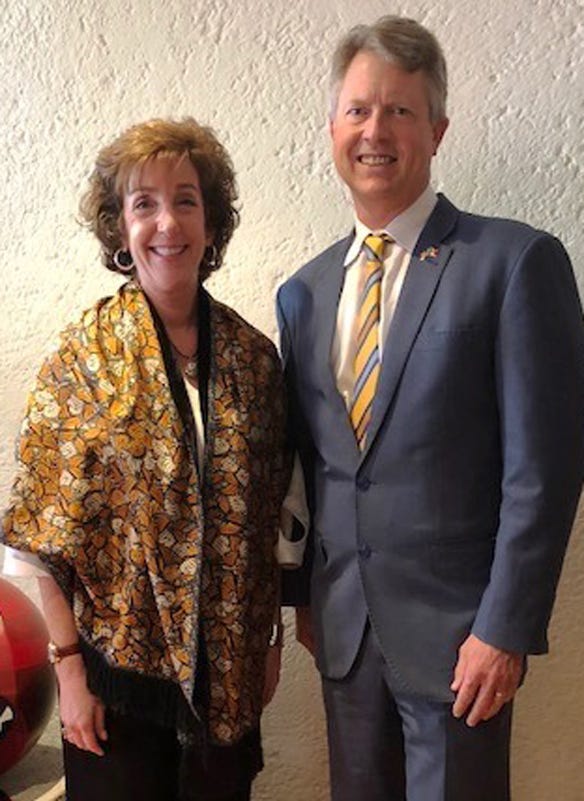
Rep. Roger Marshall, R-Kan., was a participant in the latest round of negotiations with the trade teams discussing the modernization of the North American Free Trade Agreement. He came away from the talks in Mexico City impressed with the process.
"My colleagues know how hard I have been fighting for NAFTA, I was ecstatic to be invited to join this trip,” Marshall says. “I represent the second-most NAFTA dependent district in the country, and I was honored to advocate on behalf of our Kansas producers with leaders from Mexico and Canada."
He had high praise for the negotiating teams, saying it is clear that negotiators understand that all three countries benefit from the agreement.
“These are some of the most professional people I have ever met,” Marshall says. “It’s literally like they have a PhD in trade. That’s all the teams, our team and the teams from Canada and Mexico. We made incredible progress.”
Marshall went on this trip with Ways and Means Committee chairman Kevin Brady, R-Texas, Ways and Means Trade Subcommittee ranking member Bill Pascrell, D-N.J., Rep. Sander Levin, D-Mich., Rep. Adrian Smith, R-Neb., Rep. Tom Rice, R-S.C., and Rep. Will Hurd, R-Texas.
He says it was important to him and to other members of Congress attending the talks to make it clear that the final decision on trade agreements rests with Congress and is not the in the control of the executive branch.
“It is Congress that’s in charge, and the president works for us,” Marshall says.
 MEETING AMABASSADOR: Rep. Roger Marshall, right, is shown with U.S. Ambassador to Mexico, Roberta Jacobson.
MEETING AMABASSADOR: Rep. Roger Marshall, right, is shown with U.S. Ambassador to Mexico, Roberta Jacobson.

He says the Canadian delegation did express deep disappointment at President Trump’s threat to impose steep tariffs on steel and aluminum, but the negotiators remained focused on working to find areas where agreement could be reached.
He added that career staff of the House Ways and Means Committee are in daily contract with the USTR to offer advice on trade issues.
One of the issues Marshall says he expects to see solved is the disparity in what tourists or visitors are allowed to bring back across their home country border duty-free — an important consideration for businesses who benefit from selling merchandise to tourists.
The U.S. allows returning tourists to bring back up to $800 of duty-free merchandise. Mexico only allows its citizens to bring back $50 in goods and Canada only allows $16.
“I think both of those trade teams realize that disparity is too great,” Marshall said. “I think fixing that is reasonable.”
Marshall says that even though Trump and Mexican President Enrique Peña Nieto had a sharp disagreement over Trump’s insistence that Mexico pay for a border wall, resulting in Pena Nieto canceling a White House visit, the subject of the wall did not come up in the trade talks.
Roberta S. Jacobson, U.S. Ambassador to Mexico, announced in the wake of tensions that she would resign from her post in May after serving for two years.
Marshall says he doesn’t think the issues surrounding dairy trade with Canada will be a “do or die” issue when it comes to finalizing an agreement. Of more concern, he says, are rules of origin on manufacturing, especially auto manufacturing, and rules that surround protecting U.S. investors, especially in Mexico, in the event of political problems or changes in policy.
“We need to know, for example, that a grain handling company located in Mexico to help facilitate the movement of Kansas wheat or corn to end users will be protected from political decisions that create disparity,” Marshall said.
The congressman added that his personal goal in being part of the talks was to be sure the U.S. Trade Representative and his counterparts in Canada and Mexico understand that NAFTA is working and has worked well for American agriculture.
“Ag exports to Canada and Mexico have gone up seven-fold since NAFTA was instituted and sales of U.S. merchandise into those markets has more than doubled. At the congressional level, nobody is talking about scrapping NAFTA. There’s modernization that needs to be done and few issues to address but we’re getting there.”
Marshall also hailed the addition of Kansan Greg Doud as chief agricultural negotiator and Iowan Bill Northey as undersecretary for farm and foreign agricultural service at USDA. He says getting staff positions at USDA and the USTR are important to making progress on trade agreements.
About the Author(s)
You May Also Like




